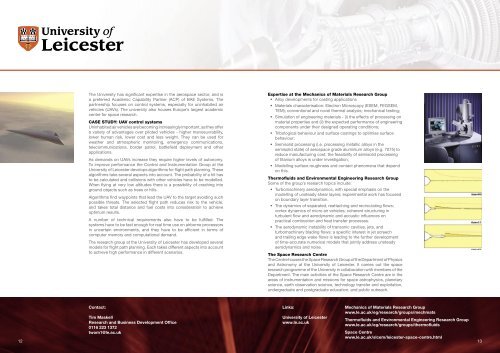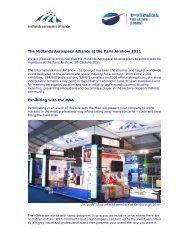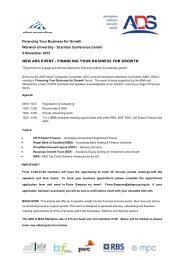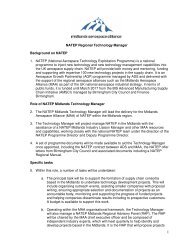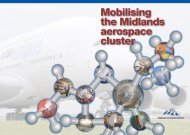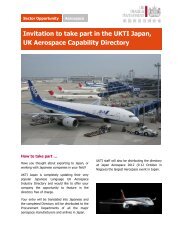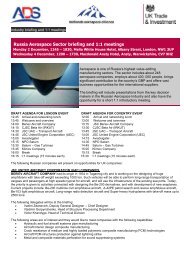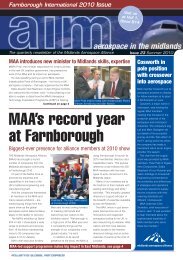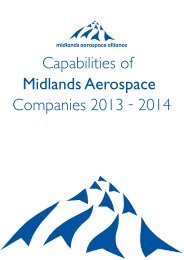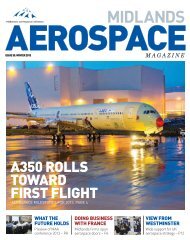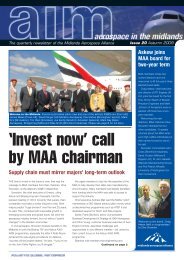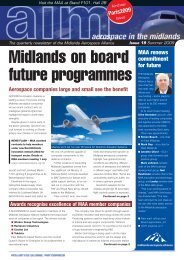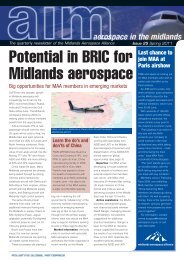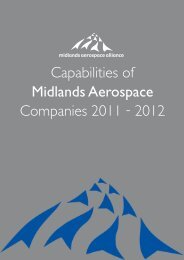new technology for aerospace
here - Midlands Aerospace Alliance
here - Midlands Aerospace Alliance
You also want an ePaper? Increase the reach of your titles
YUMPU automatically turns print PDFs into web optimized ePapers that Google loves.
The University has significant expertise in the <strong>aerospace</strong> sector, and is<br />
a preferred Academic Capability Partner (ACP) of BAE Systems. The<br />
partnership focuses on control systems, especially <strong>for</strong> uninhabited air<br />
vehicles (UAVs). The university also houses Europe’s largest academic<br />
centre <strong>for</strong> space research.<br />
CASE STUDY: UAV control systems<br />
Uninhabited air vehicles are becoming increasingly important, as they offer<br />
a variety of advantages over piloted vehicles - higher manoeuvrability,<br />
lower human risk, lower cost and less weight. They can be used <strong>for</strong><br />
weather and atmospheric monitoring, emergency communications,<br />
telecommunications, border patrol, battlefield deployment and other<br />
applications.<br />
As demands on UAVs increase they require higher levels of autonomy.<br />
To improve per<strong>for</strong>mance the Control and Instrumentation Group at the<br />
University of Leicester develops algorithms <strong>for</strong> flight path planning. These<br />
algorithms take several aspects into account. The probability of a hit has<br />
to be calculated and collisions with other vehicles have to be modelled.<br />
When flying at very low altitudes there is a possibility of crashing into<br />
ground objects such as trees or hills.<br />
Algorithms find waypoints that lead the UAV to the target avoiding such<br />
possible threats. The selected flight path reduces risk to the vehicle,<br />
and takes total distance and fuel costs into consideration to achieve<br />
optimum results.<br />
A number of technical requirements also have to be fulfilled. The<br />
systems have to be fast enough <strong>for</strong> real time use on airborne processors<br />
in uncertain environments, and they have to be efficient in terms of<br />
computer memory and computational demand.<br />
The research group at the University of Leicester has developed several<br />
models <strong>for</strong> flight path planning. Each takes different aspects into account<br />
to achieve high per<strong>for</strong>mance in different scenarios.<br />
Expertise at the Mechanics of Materials Research Group<br />
• Alloy developments <strong>for</strong> casting applications<br />
• Materials characterisation: Electron Microscopy (ESEM, FEGSEM,<br />
TEM); conventional and novel thermal analysis; mechanical testing;<br />
• Simulation of engineering materials - (i) the effects of processing on<br />
material properties and (ii) the expected per<strong>for</strong>mance of engineering<br />
components under their designed operating conditions;<br />
• Tribological behaviour and surface coatings to optimise surface<br />
behaviour;<br />
• Semisolid processing (i.e. processing metallic alloys in the<br />
semisolid state) of <strong>aerospace</strong> grade aluminium alloys (e.g. 7075) to<br />
reduce manufacturing cost; the feasibility of semisolid processing<br />
of titanium alloys is under investigation;<br />
• Modelling surface roughness and contact phenomena that depend<br />
on this.<br />
Thermofluids and Environmental Engineering Research Group<br />
Some of the group’s research topics include:<br />
• Turbomachinery aerodynamics, with special emphasis on the<br />
modelling of unsteady shear layers; experimental work has focused<br />
on boundary layer transition.<br />
• The dynamics of separated, reattaching and recirculating flows;<br />
vortex dynamics of micro air vehicles; coherent structuring in<br />
turbulent flow and aerodynamic and acoustic influences on<br />
practical combustion and heat transfer processes.<br />
• The aerodynamic instability of transonic cavities, jets, and<br />
turbomachinery blading flows; a specific interest in jet screech<br />
and trailing edge wake flows is leading to the further development<br />
of time-accurate numerical models that jointly address unsteady<br />
aerodynamics and noise.<br />
The Space Research Centre<br />
The Centre houses the Space Research Group of the Department of Physics<br />
and Astronomy at the University of Leicester. It carries out the space<br />
research programme of the University in collaboration with members of the<br />
Department. The main activities of the Space Research Centre are in the<br />
areas of instrumentation and missions <strong>for</strong> space astrophysics, planetary<br />
science, earth observation science, <strong>technology</strong> transfer and exploitation,<br />
undergraduate and postgraduate education, and public outreach.<br />
Contact:<br />
Tim Maskell<br />
Research and Business Development Office<br />
0116 223 1372<br />
twom1@le.ac.uk<br />
Links:<br />
University of Leicester<br />
www.le.ac.uk<br />
Mechanics of Materials Research Group<br />
www.le.ac.uk/eg/research/groups/mechmats<br />
Thermofluids and Environmental Engineering Research Group<br />
www.le.ac.uk/eg/research/groups/thermofluids<br />
Space Centre<br />
www.le.ac.uk/slcem/leicester-space-centre.html<br />
12 13


